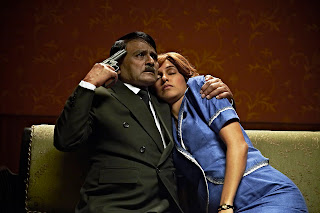Release date:
|
August 12, 2011
|
Director:
|
Prakash Jha
|
Cast:
|
Amitabh Bachchan, Deepika Padukone, Manoj Bajpai, Saif Ali Khan, Prateik, Tanvi Azmi
|
Aarakshan would have been perfect if it had been a show on a TV news channel on the subject of reservations. It covers pretty much every aspect of the debate – from caste tensions that arise as a consequence of quotas to the history of exploitation of lower castes, the need for positive discrimination and the frustrations of meritorious upper caste students.
But although Aarakshan starts off well, it tries to pack in too much into one film, beyond a point it lacks focus since it seems torn between reservations and the overall flaws in our education system, and somewhere past the halfway mark it just seems to go on and on and on. This is a pity because where it’s good, Aarakshan is really good. If ever there was a balanced discussion on the issue of reservations, it is this. Dear protestors, for god’s sake this film is neither anti- nor pro-Dalit. If anything, it’s pro-poor and anti-manipulation-of-the-public-by-politicians. There’s something very poignant about the idealistic Gandhian character Dr Prabhakar Anand played by Amitabh Bachchan who is far more impractical than the Mahatma ever was, and seems incapable of coping with the numerous behind-the-scenes pressures on a principal of a prestigious college (though it’s impossible to believe that he survived in the job for over two decades before the start of the action in this film). Despite the patriarchal tone to Anand’s relationship with his wife and daughter, it’s still moving. And there’s something very realistic about the portrayal of caste tensions – some latent, some blatant – among the students of a college in a North Indian city … you can either bury your head in the ground or accept the truth that this does happen.
Bachchan pitches in a solid performance as Anand, though I wish writers wouldn’t be so tempted to throw in a few English dialogues for him in every film, in a seeming bid to impress us with his uncommonly good accent in both Hindi and English. There are at least two points at which he is made to give a direct translation of a dialogue he’s just delivered – “kya aap mujh par jaativaad ka aarop laga rahe hai?” followed by “are you accusing me of being casteist?”! C’mon, we Indians mix languages, we don’t dutifully translate our sentences in conversation! Manoj Bajpai is impeccably slimy as Anand’s bête noir Mithilesh Singh, the teacher who exploits his students financially, though I found the excessive make-up on his forehead quite distracting. Deepika Padukone plays Anand’s daughter Poorbi with elan and is blessed with some of the most powerful scenes in the film which she could have overplayed but does not – particularly moving is her showdown with her infuriatingly upright father, a scene that reduced me to a bumbling, blubbering mass of tears. Saif Ali Khan as Dr Anand’s poor Dalit protégé Deepak Kumar who ends up as a University rank-holder is as good as he always is. Those who question the director’s decision to cast Saif as a Dalit should consider rising above the stereotype in their own minds of what a Dalit looks like! Would they have objected if Saif was not a light-skinned, handsome fellow with a sharp, pointed nose?
The huge disappointment in this cast is Prateik, who was the discovery of Jaane Tu Ya Jaane Na and was excellent in this year’s Dhobi Ghat. But in Aarakshan he appears spaced out beyond recognition, his dialogue delivery is laboured and he seems strangely uninvolved in the role.
If you look at a balance sheet then, Aarakshan has more going for it than against. The film’s first two hours are filled with high drama, emotion and tension as the reservation issue causes conflict in Shakuntala Thakral Mahavidyalaya, Bhopal, where Dr Anand is the principal. But I can pinpoint the exact moment from which it began to stretch itself to become boring for me. It was right after Poorbi’s raging fight with her father – beyond which the film gets defused, Bachchan is given too many speeches to deliver and we are subjected to too many lengthy classroom sessions with details of mathematical equations. Besides, the film appears to condone Dr Anand’s accept-me-without-question autocratic attitude simply because the writers seem not to want to concede that their protagonist is flawed too (pretty much the way Bachchan’s patriarchal Raj Malhotra was painted in hagiographic shades in Baghban). Also, Poorbi’s you-are-what-you-are-only-because-of-my-father sermon to Deepak seems to carry a sub-text that the messiahs of the Dalits have always been benevolent members of the upper castes and that the lower castes can take no credit for their own achievements!
When the last half hour of a film feels like 30 minutes too much, there’s something seriously wrong. But still, Aarakshan raises some important questions and pulls it off for about two hours of its 2 hour 40 minutes running time. For all its flaws then, Aarakshan will hopefully contribute to the national debate on reservations.
Rating (out of five): **1/2
CBFC Rating: U/A without cuts
Running time: 160 Minutes
Language: Hindi
Photograph courtesy: http://www.facebook.com/#!/Aarakshanthefilm





